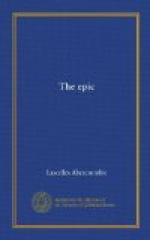Such, in a broad description, is the nature of epic poetry. To define it with any narrower nicety would probably be rash. We have not been discovering what an epic poem ought to be, but roughly examining what similarity of quality there is in all those poems which we feel, strictly attending to the emotional experience of reading them, can be classed together and, for convenience, termed epic. But it is not much good having a name for this species of poetry if it is given as well to poems of quite a different nature. It is not much good agreeing to call by the name of epic such poems as the Iliad and the Odyssey, Beowulf and the Song of Roland, Paradise Lost and Gerusalemme Liberata, if epic is also to be the title for The Faery Queene and La Divina Commedia, The Idylls of the King and The Ring and the Book. But I believe most of the importance in the meaning of the word epic, when it is reasonably used, will be found in what is written above. Apart from the specific form of epic, it shares much of its ultimate intention with the greatest kind of drama (though not with all drama). And just as drama, whatever grandeur of purpose it may attempt, must be a good play, so epic must be a good story. It will tell its tale both largely and intensely, and the diction will be carried on the volume of a powerful, flowing metre. To distinguish, however, between merely narrative poetry, and poetry which goes beyond being mere narrative into the being of epic, must often be left to feeling which can scarcely be precisely analysed. A curious instance of the difficulty in exactly defining epic (but not in exactly deciding what is epic) may be found in the work of William Morris. Morris left two long narrative poems, The Life and Death of Jason, and The Story of Sigurd the Volsung.




